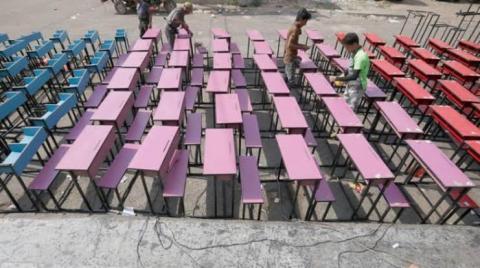Drones evolving into terrorists' 'weapon of choice' in the region, experts warn


Recent events have shown the growing risk of drone attacks by terrorist groups in the region, such as those launched against the UAE by Yemen's Iran-backed Houthi rebels, experts at an Abu Dhabi conference have warned.
The Unmanned Systems Exhibition (UMEX), running until Wednesday, began in the UAE capital with regional and Western military and industry representatives, including from the United States, Britain and France.
Speakers addressed the importance of developing Unmanned Aerial Systems (UAS) for civil and military uses but also acknowledged their dangers when used by groups deemed a threat to the region.
While the event will showcase the latest in high-tech drone technology, the host country warned that such weapons are becoming cheaper and more widespread.
They are now part of the arsenals of "terrorist groups that use the systems to terrorise civilians or to impact the global system in a negative way," said the UAE's Minister of State for Artificial Intelligence, Omar bin Sultan al-Olama.
"That is a challenge that requires us to ... work together to ensure that we can create a shield against the use of these systems."
The explosive-laden drones provide cheap weapons for Iran and its proxy militias in the region, in particular.
Since they can be assembled and modified from inexpensive and widely available parts, radical groups and terrorist organisations can consider the drones their “weapon of choice” in carrying out subversion and destabilisation activities.
This explains the wide use of drones by groups such as Yemen's Houthis, Iraq's Popular Mobilisation Forces and Iran's Hezbollah.
The UAE is part of a Saudi-led military coalition that has been fighting in Yemen since 2015 to support the internationally-recognised government against Iran-backed Houthi rebels.
While the Emirates announced it withdrew its troops from the country in 2019, it remains an influential player, backing fighters who have inflicted severe defeats on the Houthis in recent weeks.
The UAE has been on heightened alert since a Houthi drone and missile attack killed three oil workers in Abu Dhabi on January 17. The authorities have since thwarted three similar attacks, including one claimed by a little-known militant group believed to have ties with pro-Iran armed factions in Iraq. Regional experts saw Iran's hands behind the acts regardless of the proxy cover used.
The UAE's ally the United States has deployed a warship and fighter planes to help protect the Middle East financial and leisure hub, which despite the drone attacks is still perceived as a safe haven in the volatile region.
France also said it would bolster its defence cooperation with the UAE, mostly in securing its air space.
In December, the Saudi-led coalition said the Houthis had fired more than 850 attack drones and 400 ballistic missiles at the kingdom in the past seven years, killing a total of 59 civilians.
That figure compares with the 401 coalition air raids carried out in January alone over Yemen, according to the Yemen Data Project, an independent tracker which reported around 9,000 civilian fatalities from the strikes in that country since 2015.
Difficult to counter
While many countries call for a collective effort to protect airspaces against the small and often hard-to-detect targets, one question remained: how to easily stop a drone attack?
So far, options to counter drones have seemed limited. This is due to several considerations, most notably the drone's great ability to infiltrate the skies of targeted countries. Also, Patriot and THAAD missile defence systems used in the region were designed to shoot down ballistic missiles flying at high altitudes, not low flying drones.
By working to send drones in swarm formations, Iran tries to further complicate the task of thwarting its instigated attacks.
"We have to unite to prevent the use of drones from threatening civilian safety and destroying economic institutions," said Mohammed bin Ahmed al-Bowardi, United Arab Emirates' Minister of State for Defence Affairs.
EDGE, a UAE manufacturer tasked with supplying advanced weapons to the UAE armed forces, is focused on developing drones, unmanned vehicles, smart weapons and electronic warfare equipment rather than conventional weaponry. It is developing a directed energy system, to be unveiled next year, that can be used against aerial and land threats
Last year the United States and Israel said an Iranian drone attacked a ship managed by an Israeli billionaire as it sailed off Oman. Two crew members were killed.
More recently, Israel's military said its air defences fired at a drone that had crossed into its airspace from Lebanon on Friday, the second UAS intrusion in as many days.
Such incidents have again raised concerns about the dangers of bomb-laden drones. Some are difficult for radar to detect and require a complex process to shoot down without causing casualties from falling shrapnel.

Yemeni officials on Monday condemned arrests and prosecutions by the Iran-backed Houthi militia directed against media, journalists and celebrities…

Yemen's warring parties are gearing up for new waves of conflict in 2023 amid a lack of decisive steps towards sustainable peace, adding to the suf…

The UAE will help to recruit doctors and deliver crucial supplies for hospitals in Yemen under a major healthcare drive. The Khalifa bin…